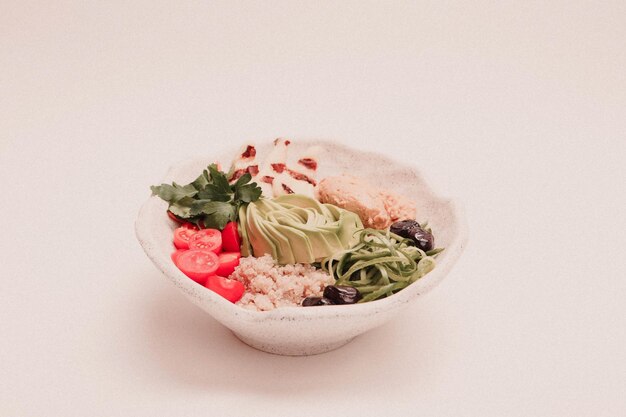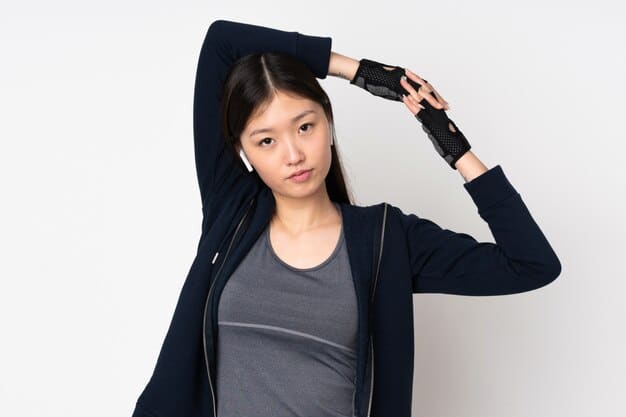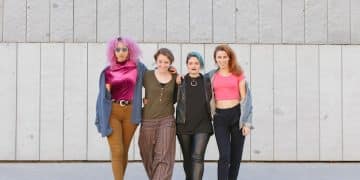K-Pop Idol Diets: Impact on Performance and Health in the US

K-Pop idol diet plans in the US are intensely scrutinized for their potential impact on the idols’ performance and long-term health, as these diets often involve extreme calorie restrictions and nutritional imbalances.
The glittering world of K-Pop, with its synchronized dances and catchy tunes, often conceals a harsh reality: the extreme diet plans many idols follow. In the US, there’s increasing concern about the impact of these K-Pop Idol Diet Plans: Analyzing the Nutritional Impact on Performance and Health in the US, as they strive to maintain a perfect image. But at what cost?
Understanding K-Pop Idol Diet Culture in the US
The K-Pop industry is known for its intense focus on image, and this is especially true when we look at the diet plans that idols adhere to. In the US market, where K-Pop has gained immense popularity, these diets are often a subject of fascination and, increasingly, concern.
Many K-Pop idols feel immense pressure to meet rigorous aesthetic standards, often fueled by both their agencies and fan expectations. They go through intense training and adhere to diets that may be far from healthy or sustainable. This can lead to significant health challenges over time.
The Pressure to Be Perfect
The emphasis on physical appearance in K-pop is relentless. Idols are constantly under the scrutiny of cameras, and any fluctuation in weight can be heavily criticized. This immense pressure can understandably lead to unhealthy eating habits.
- Agencies often set strict weight goals for idols.
- Public perception and fan expectations heavily influence diet choices.
- Social media amplifies body image pressures.
This pressure isn’t just about looking good; it’s tied to their success and marketability in the industry. This can foster a harmful environment where dangerous dieting practices are normalized.
Common Dietary Restrictions
Several common dietary restrictions are observed among K-Pop idols. These range from short-term weight loss strategies to long-term restrictive eating plans.

- The “paper cup diet” involves limiting food intake to what can fit in a paper cup.
- One-food diets, such as only eating sweet potatoes or bananas, are sometimes followed for quick weight loss.
- Extreme calorie restriction, often limiting intake to 500-800 calories a day.
- Intermittent fasting is also practiced, with long periods of food deprivation.
These restrictive diets can have serious consequences, including nutrient deficiencies, fatigue, and mental health issues. It’s important to recognize the risks involved and understand that these extreme practices are not sustainable or healthy.
In conclusion, the diet culture in K-Pop places immense pressure on idols to maintain a specific image. The restrictions they adhere to can lead to significant health challenges, highlighting the need for a more balanced approach to health and wellness within the industry.
Analyzing the Nutritional Deficiencies in Idol Diets
Many K-Pop idol diets, particularly those employed for rapid weight loss or maintenance of a thin physique, are severely lacking in essential nutrients. This can lead to a range of health issues, both short-term and long-term.
Understanding the specific nutritional deficiencies that arise from these diets is vital for assessing the true impact on an idol’s health and well-being. Proper nutrition is central to overall health.
Lack of Macronutrients
Macronutrients—carbohydrates, proteins, and fats—are fundamental to energy production, muscle development, and overall physiological function. Many K-Pop diets severely restrict these important nutrients.
- Carbohydrate restriction can lead to low energy levels and impaired cognitive function.
- Protein deficiency can result in muscle loss and weakened immune function.
- Insufficient healthy fats can impact hormone production and brain health.
When idols drastically cut down on these macronutrients, they are essentially depriving their bodies of the fuel and building blocks they need to function optimally.
Micronutrient Deficiencies
Micronutrients, including vitamins and minerals, play critical roles in countless biological processes. Restrictive diets often fail to provide sufficient amounts, resulting in deficiencies that can impair overall health.
Common micronutrient deficiencies linked to restrictive diets include:
- Iron Deficiency: Can cause fatigue, weakness, and impaired cognitive function.
- Vitamin D Deficiency: Impacts bone health, immune function, and mood regulation.
- Calcium Deficiency: Weakens bones and increases the risk of fractures.
- B Vitamin Deficiencies: Affect energy levels, nerve function, and cell metabolism.
These deficiencies can have far-reaching effects, impacting everything from physical performance to mental well-being. For idols, whose careers demand peak performance, these nutritional gaps can be particularly problematic.
The Long-Term Effects of Nutritional Imbalance
The ongoing nutritional imbalances in K-Pop idol diets extend beyond immediate symptoms, leading to significant long-term health problems. These can include:
- Osteoporosis: Weakened bones due to chronic calcium and vitamin D deficiencies.
- Metabolic Issues: Disrupted metabolism leading to weight gain, insulin resistance, and increased risk of type 2 diabetes.
- Cardiovascular Problems: Increased risk of heart disease due to poor dietary choices and nutritional deficiencies.
These long-term effects underscore the importance of addressing the nutritional needs of K-Pop idols to prevent irreversible health damage.
In summary, K-Pop idol diets often lack important macronutrients and micronutrients, which can lead to a variety of severe health issues in the long run. Addressing and correcting these dietary deficiencies is vital for protecting their health and ensuring sustainable well-being.
Impact on Physical Performance: Energy Levels and Stamina
The demanding schedules and high-energy performances of K-Pop idols require optimal physical conditioning. However, restrictive diets often undermine their ability to perform at their best by affecting their energy levels and stamina.
Understanding how these diets impact physical performance is crucial for addressing the health and sustainability of K-Pop idols’ careers. Their performance relies heavily on their stamina and energy levels.
Reduced Energy Levels
Energy levels are directly influenced by dietary intake, particularly the availability of carbohydrates and fats. Restrictive diets often lead to chronic fatigue and decreased physical stamina. Adequate energy for peak performance is important.
Reduced energy levels can manifest as:
- Lethargy and fatigue during practices and performances.
- Difficulty concentrating and impaired cognitive function.
- Decreased motivation and overall performance quality.
These symptoms can significantly hinder an idol’s ability to meet the intense demands of their profession, affecting their competitive edge.
Decreased Stamina
Sustained physical activity requires endurance, which is fueled by adequate calorie and nutrient intake. Restrictive diets compromise stamina, making it difficult for idols to maintain high-energy performances.

The effects on stamina include:
- Inability to sustain high-intensity dance routines.
- Shortness of breath and increased heart rate during performances.
- Slower recovery times after physical exertion.
These factors not only diminish performance quality but also increase the risk of injuries. Stamina is very important for sustaining energy.
Increased Risk of Injury
Nutrient deficiencies and low energy levels can compromise muscle strength and bone density, increasing the susceptibility to injuries. K-Pop idols require strength and bone density.
Idols are at increased risk of:
- Muscle strains and sprains during intensive practices.
- Stress fractures due to weakened bones.
- Increased recovery time from injuries.
Protecting against injuries requires a holistic approach that includes supportive nutrition to fuel muscle strength and bone health.
In conclusion, restrictive diets have a detrimental effect on the physical performance of K-Pop idols. They have a decrease in energy levels and stamina which increases their risks of injury. Adequate nutrition is essential for sustaining their demanding routines and protecting their long-term health.
Psychological Impact: Stress, Anxiety, and Eating Disorders
The intense pressures to conform to strict beauty standards and maintain extreme diets can take a significant toll on the mental health of K-Pop idols. Stress, anxiety, and eating disorders are common psychological challenges.
Understanding the psychological consequences of these extreme practices is essential for prioritizing the mental well-being of idols and promoting a healthier industry culture. Focus should be on health and wellness.
Increased Stress and Anxiety
The pressure to adhere to strict diets and maintain a perfect image can lead to chronic stress and anxiety. This can be amplified by the demanding schedules and constant public scrutiny. The focus should be on health and wellness to help them thrive.
Symptoms of stress and anxiety may include:
- Constant worry about weight and appearance.
- Sleep disturbances and insomnia.
- Irritability and mood swings.
Managing stress and anxiety requires a holistic approach that includes psychological support, stress management techniques, and a balanced lifestyle.
Eating Disorders and Disordered Eating
Restrictive diets and obsession with body image contribute to the development of eating disorders such as anorexia, bulimia, and binge eating disorder.
Common signs of eating disorders include:
- Excessive calorie counting and restrictive eating habits.
- Binge eating episodes followed by purging behaviors.
- Distorted body image and obsession with weight.
Seeking early intervention and professional treatment are crucial for managing and recovering from eating disorders. Early intervention provides the best approach.
Impact on Self-Esteem and Body Image
Constant pressure to conform to unrealistic beauty standards can significantly lower self-esteem and distort body image, leading to feelings of inadequacy and self-doubt.
Individuals may experience:
- Negative self-talk and constant self-criticism.
- Avoidance of social situations due to body image concerns.
- Decreased confidence and overall well-being.
Promoting body positivity, self-acceptance, and mental health support are essential for building resilience and counteracting the negative impact.
In conclusion, the psychological impact of K-Pop idol diets is substantial. Including mental health as part of their wellness is vital. Addressing these issues requires creating a supportive environment that promotes mental well-being and counters the pressure to conform to unrealistic beauty standards.
Agency Responsibility: Balancing Aesthetics with Health
K-Pop agencies play a crucial role in shaping the diets and lifestyles of their idols. It is very important that the agencies take responsibility for prioritizing health and well-being alongside aesthetic expectations.
A cultural shift within the industry is necessary to ensure that idols are not subjected to dangerous and unsustainable dieting practices. Health and wellness should be incorporated as part of their culture.
Setting Realistic Expectations
Agencies should establish realistic and healthy weight goals for idols, based on individual body types and nutritional needs. This encourages health and wellness. Unrealistic expectations can be very harmful to idols.
Key strategies include:
- Avoiding extreme weight loss goals and timelines.
- Focusing on overall health and fitness rather than just appearance.
- Promoting body positivity and self-acceptance.
Having realistic timelines for health and wellness can reduce a lot of issues that come with having unrealistic expectations.
Providing Nutritional Support and Education
Agencies should provide idols with access to registered dietitians and nutritionists who can develop personalized meal plans. Nutritional education is key to maintaining positive health and wellness.
- Offering regular nutritional counseling and education sessions.
- Providing balanced meals and snacks that meet their nutritional needs.
- Monitoring and addressing any nutritional deficiencies.
This will make sure that idols are aware of how to manage their bodies to the best of their abilities.
Promoting a Supportive Culture
Creating a culture that prioritizes mental health and overall well-being is essential. A supportive culture is key to an idol feeling safe and welcomed.
- Providing access to mental health professionals and counselors.
- Encouraging open communication about health concerns.
- Promoting healthy lifestyle choices and self-care practices.
In summary, K-Pop agencies have a responsibility to promote the health and well-being of their idols. Prioritizing health and well-being is vital for the sustained success and happiness of the idols. By balancing aesthetic expectations with comprehensive support; agencies can reduce any harmful effects of idol diets.
Exploring Sustainable and Healthy Diet Alternatives
Moving away from extreme dieting requires exploring sustainable and healthy alternatives that support both physical and mental health. There needs to be a move to sustainable diets to have a long-term effect.
Embracing a balanced approach to nutrition and wellness can help K-Pop idols maintain their performance levels while safeguarding their long-term health. This balanced approach to health is vital to their success.
Balanced Macronutrient Intake
A balanced approach to macronutrient intake ensures that idols receive adequate carbohydrates, proteins, and fats to fuel their energy and support muscle development is important. Nutrition is important for their development.
- Including complex carbohydrates like whole grains and vegetables for sustained energy.
- Incorporating lean protein sources such as chicken, fish, and legumes for muscle repair.
- Consuming healthy fats from sources like avocados, nuts, and olive oil for hormone production.
This will fuel their bodies to work to their maximum capabilities and potential.
Prioritizing Micronutrient-Rich Foods
Focusing on micronutrient-rich foods such as fruits, vegetables, and whole grains ensures that idols receive essential vitamins and minerals. They need to improve their micronutrient focus.
Strategies include:
- Eating a variety of colorful fruits and vegetables to cover a wide range of vitamins and minerals.
- Consuming fortified foods or supplements if necessary to address specific deficiencies.
- Choosing whole, unprocessed foods over refined and processed options.
This will give the idols a much-needed boost to their overall health and wellness.
Mindful Eating and Portion Control
Practicing mindful eating and portion control can help idols develop a healthier relationship with food, reducing the risk of overeating or restrictive dieting. Having a good relationship with food is key. It’s all about having control and awareness around food consumption.
- Paying attention to hunger and fullness cues.
- Savoring each bite and eating slowly.
- Avoiding distractions during meals.
Through awareness and being in control of food habits, they can perform to their best potential. These things can help idols manage and control their diets.
In conclusion, sustainable and healthy diet alternatives are essential for K-Pop idols to maintain their performance levels and protect their long-term wellness. With a balanced diet, this is possible. By prioritizing a balanced intake of macronutrients and micronutrients; engaging with mindful eating; K-Pop idols can have a longer and more sustainable career.
| Key Point | Brief Description |
|---|---|
| ⚠️ Diet Culture | K-Pop industry has standards enforced by fan expectations. |
| 📉 Nutritional Deficiencies | Diets often lack essential nutrients vital for health. |
| 🤕 Physical Toll | Low energy and stamina which leads to more injuries. |
| 🧑🤝🧑 Support System | Providing mental health professionals to create a healthier environment. |
Frequently Asked Questions
▼
K-Pop idols commonly follow restrictive diets like the “paper cup diet,” one-food diets (e.g., sweet potatoes), and extreme calorie restriction (500-800 calories/day.) These are often for rapid weight loss.
▼
The idol’s physical performance is impacted by decreasing energy levels and stamina. This also can lead to a higher risk of injury. Nutrition is important for their overall health.
▼
The diets increase stress, anxiety, and may lead to eating disorders in K-Pop idols. There can also be impacts with self-esteem and body image within K-Pop idols.
▼
Agencies can set realistic expectations. They should prioritize nutritional support and education. This is important to ensure their idol’s health is at it’s maximum potential.
▼
Alternatives include balanced macronutrient intake and prioritizing micronutrient-rich foods. Another alternative is mindful eating and portion control techniques in order to self-manage their diet.
Conclusion
In conclusion, the extreme diet plans of K-Pop idols in the US raise significant concerns regarding their impact on both physical performance and long-term health. Shifting towards sustainable and balanced dietary approaches, supported by agencies and a culture of well-being, can better safeguard the health and longevity of K-Pop idols’ careers.





